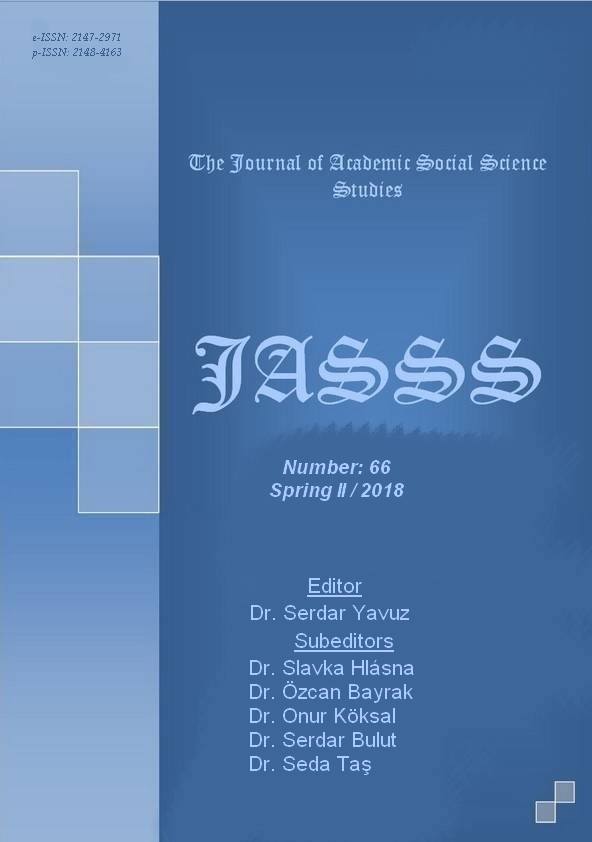ZİHİNSEL ENGELLİ ÇOCUĞA SAHİP OLAN ANNELERİN KARŞILAŞTIKLARI GÜÇLÜKLER (İSTANBUL-PENDİK İL-ÇESİ ÖRNEĞİ)
Author :
Abstract
Zihinsel engelli çocuğa sahip ailelerin ve özelde annelerin karşılaştıkları psikolo-jik, ekonomik ve sosyal olmak üzere birçok güçlük bulunmaktadır. Çoğu durumda bu güçlükler tüm açıklığı ile görülememektedir. Bu çalışma İstanbul-Pendik ilçesinde zihin-sel engelli çocuğa sahip olan annelerin örneği ile çocuklarını yetiştirirken yaşanan güç-lükleri görünür kılabilmek ve bu güçlükleri hafifletebilmek için önerilerde bulunabilme-yi amaçlamaktadır. Araştırmanın örneklemini İstanbul-Pendik ilçesinde ikamet eden zi-hinsel engelli çocuğa sahip 7 anne oluşturmaktadır. Çalışmada yarı yapılandırılmış gö-rüşme formu kullanılarak derinlemesine mülakat yapılmıştır. Elde edilen veriler ekono-mik sorunlar, psikolojik sorunlar, sosyal sorunlar, eğitim sorunları ve aile ilişkilerinde ortaya çıkan sorunlar olmak üzere beş ayrı kategoride sınıflandırılmıştır. Verileri açıkla-mak amacıyla betimsel analiz yöntemi tematik çerçeve kullanılarak gerçekleştirilmiştir. Buna göre zihinsel engelli çocuğa sahip ailelerin ve özelde annelerin daha fazla strese maruz kaldıkları, çocuğun bakımı için daha fazla zaman ayırmak zorunda kaldık-ları, maddi kaynaklara daha çok ihtiyaç duydukları, sosyal ilişkilerinde ise daha temkinli ve sınırlı davrandıkları tespit edilmiştir. Aynı zamanda var olan sıkıntılar eşler arası iliş-kileri de yüksek düzeyde etkilemektedir. Çalışma sonunda karşılaşılan güçlüklerin hafif-letilmesinde sadece zihinsel engelli çocuğa sahip ailelerin desteklenmesinin yeterli olma-yacağı, bu güçlüklerin arkasında yatan nedenler analiz edildiğinde toplumsal işleyişin düzenlenmesinin ve toplumsal farkındalığın artırılmasının da aynı derecede önemli ol-duğu görülmüştür.
Keywords
Abstract
Having a mentally handicapped child has many difficulties in terms of psycho-logical, economic and social aspects, that are encountered families and especially by mothers. In most cases, these difficulties cannot be seen with all the clarity. The objective of this study is to be able to make the difficulties experienced in growing such children obvious and to offer suggestions for mitigating these difficulties through the example of mothers with mentally handicapped children in Istanbul-Pendik province. The sample of the research consists of 7 mothers with mentally disabled children living in Istanbul-Pendik county. In-depth interviews were conducted using semi-structured interview form. The data obtained are classified into five categories: economic problems, psychological problems, social problems, educational problems and problems arising in family rela-tions. In order to explain the data, the descriptive analysis method was carried out using the thematic framework. It has been found that families with mantally handicapped children and especially mothers, are exposed to more stress, have more time to care for their children, need more financial resources, and are more cautious and limited in their social relations. At the same time, the existing stresses also influence the interpersonal relations at a high level. At the end of the study, it was understood that the support of families of children with mental disabilities would not be enough to mitigate the difficulties being encountered, and that the regulation of the social functioning and social awareness was important at the same time when the reasons behind these difficulties were analyzed.





